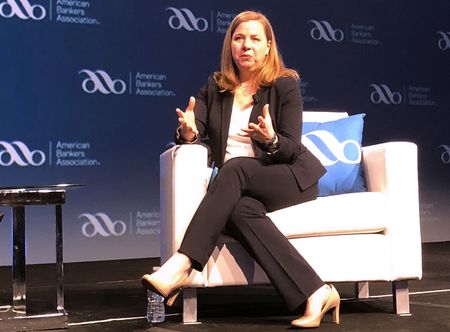By Michael S. Derby
(Reuters) – Federal Reserve Governor Michelle Bowman said on Friday that inflation risks to the economy remain real and labor market data hard to interpret, and that augurs caution with further decisions on central bank rate cuts.
“I continue to see greater risks to the price stability side of our mandate, especially when the labor market continues to be near full employment,” Bowman said at an appearance before the Missouri Bankers Association Executive Management Conference. With that in mind, “I would prefer that we proceed cautiously and gradually in lowering the policy rate, as inflation remains elevated.”
Bowman, whose comments centered mainly on banking issues, spoke after the releases of data detailing the performance of the job market during November. Hiring sharply rebounded from a difficult October with a gain of 227,000, while the unemployment rate ticked up to 4.2% from 4.1% the prior month.
The jobs data helped bolster market expectations that when policymakers gather for their next Federal Open Market Committee meeting on Dec. 17-18, they will lower the federal funds target rate range, now set between 4.5% and 4.75%, by a quarter percentage point. That would put the Fed’s primary lever to affect the economy down by a full percentage point since September.
Rate cut expectations have been underpinned by the ebbing of inflation pressures coupled with worries tight monetary policy could lead to trouble for the jobs market. Bowman dissented against the size of the Fed’s September rate cut and remains concerned about inflation.
Bowman declined to say what she thinks the Fed should do at the upcoming meeting. She said Friday’s employment report and inflation data next week would “help support a decision or my approach to how I’m thinking about the FOMC decision in a week and a half.”
Bowman said in her remarks that the economy remains strong, noting core inflation is above the Fed’s target and the unemployment rate, even as it has risen, remains well below its long-term average.
“We’ve seen progress in lowering inflation but that progress seems to have stalled this year,” Bowman said. Meanwhile, the job market is at “full employment” and the data describing the state of hiring is “increasingly difficult to interpret” and showing signs of “unreliability” in the face of “measurement challenges and data revisions.”
“I’m still cautious about taking signals from only a limited set of real-time data releases like the labor market data,” Bowman said.
The Fed governor also questioned a fundamental sense among central bankers that the current level of interest rates is providing restraint on the economy. “It’s hard to think that the level of interest rates is restrictive at this point” given how the economy is performing, she said.
(Reporting by Michael S. Derby; Editing by Chizu Nomiyama and Andrea Ricci)
